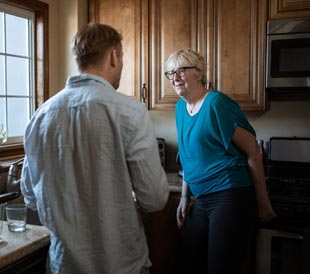PTSD
What is PTSD?
PTSD stands for Post-Traumatic Stress Disorder. It is a mental health condition that can develop in individuals who have experienced or witnessed a traumatic event. PTSD can affect people from all walks of life, including military veterans, survivors of physical or sexual assault, natural disaster survivors, and those who have been involved in accidents or combat.

Common symptoms of PTSD include:
Intrusive thoughts and memories: This includes experiencing recurrent distressing memories of the traumatic event, flashbacks, nightmares, or unwanted thoughts about the traumatic event. Individuals with PTSD also usually experience intense distress and discomfort when exposed to triggers associated with the trauma. So, for example, if a negative experience occurred near a gas station, someone with PTSD may be deeply upset and have intense thoughts triggered by just seeing the gas station logo, driving in a nearby neighborhood, or the smell of fuel.
 Avoidance and emotional numbing: People with PTSD may actively avoid situations, places, or people that remind them of traumatic events. Individuals with PTSD can go to great lengths to avoid feeling triggered or reminded of their traumas, they may feel unable to engage in activities, avoid certain people, or even avoid sensations that bring to mind their painful memories. They may also experience a diminished interest in activities they previously enjoyed and have difficulty recalling important aspects of the traumatic event. Memory is a tricky thing, and it gets so much messier when trauma is involved. Sometimes individuals with PTSD “block out” parts of their traumatic memories while other parts they may remember in vivid detail. Sometimes it is difficult for memories to be sorted chronologically, and individuals lose track of what exactly happened in what order and at what time.
Avoidance and emotional numbing: People with PTSD may actively avoid situations, places, or people that remind them of traumatic events. Individuals with PTSD can go to great lengths to avoid feeling triggered or reminded of their traumas, they may feel unable to engage in activities, avoid certain people, or even avoid sensations that bring to mind their painful memories. They may also experience a diminished interest in activities they previously enjoyed and have difficulty recalling important aspects of the traumatic event. Memory is a tricky thing, and it gets so much messier when trauma is involved. Sometimes individuals with PTSD “block out” parts of their traumatic memories while other parts they may remember in vivid detail. Sometimes it is difficult for memories to be sorted chronologically, and individuals lose track of what exactly happened in what order and at what time.
Negative changes in thinking and mood: Individuals with PTSD sometimes suffer from persistent negative beliefs or expectations about themselves or the world. Often, they struggle in the search for meaning related to the horrible event(s) they’ve experienced, i.e. How could this happen if I believe in a loving God? Am I bad because this bad thing was done to me? Can I trust anyone in the world if I trusted this person who hurt me? Individuals with PTSD also experience distorted thoughts about the cause or consequences of the trauma, i.e. Did my behavior bring on this traumatic experience? Maybe if I hadn’t made this person angry, things would have been different. Lastly, PTSD can cause feelings of detachment from others, a lack of interest in maintaining relationships, and difficulty experiencing positive emotions. Experiencing trauma can be truly an isolating experience, which is part of why it is so important to seek support and maintain healthy connections.
Hyperarousal and Reactivity: Often individuals with PTSD may exhibit an exaggerated startle response, have difficulty sleeping or concentrating, and may be hypervigilant or constantly on guard. An individual struggling with PTSD may find themselves feeling jumpy even in their own home. These individuals often feel on edge which can lead to irritability and anger outbursts.

How does PTSD impact relationships?
PTSD can have a significant impact on relationships, some of the common challenges we see include:
Emotional distance: Individuals with PTSD can withdraw emotionally from their loved ones and have a hard time sharing their feelings. This can lead to isolation for the individual and for their loved ones who don’t always know how to respond to them. A person with PTSD may struggle to articulate their feelings and experiences, leading to frustration and a decline in intimacy within relationships.

Trust issues: The experience of a traumatic event can erode trust—even with loved ones who may not be responsible for the trauma. This can strain relationships and make it challenging for the person with PTSD to feel secure and connected.
Increased conflict: Symptoms such as irritability, anger, and hypervigilance can contribute to increased conflict within relationships. A person with PTSD may have a shorter fuse leading to conflicts over seemingly minor issues. Their reactions can also be out of proportion to the frustrations, so suddenly not doing the dishes correctly leads to a screaming blow up instead of a discussion.
How does therapy help with PTSD?
Therapy can be very helpful in managing symptoms of PTSD and helping to improve relationships that have been impacted. Counseling offers a safe space where you can openly discuss traumatic experiences and associated feelings without judgment. We may provide information about PTSD, its symptoms, and its impact on daily life. Understanding the nature of PTSD can help you and your loved ones to gain insight and normalize their reactions to trauma. It is so helpful to know that you are not alone. Processing the painful memories can also help to desensitize you to the experience and can reduce the distress associated with it, as well as help to reduce avoidance behaviors.
We work with individuals to develop effective coping skills to manage symptoms such as anxiety, nightmares, flashbacks, and sleep disturbances. In therapy you can also develop insight and tools to help regulate emotions better and “stop the bleeding” in your relationships.
Therapy can also help you to challenge negative thoughts and beliefs related to the trauma. By changing the way you think about the trauma and the meaning you’ve attached to it, you can reduce the intensity of emotions associated with it and improve your overall well-being.
Counseling can also address the impact of PTSD on relationships. Couples or family therapy may be recommended to help improve communication, rebuild trust, and provide education and support to loved ones to increase empathy and help them respond in ways that help you.
An additional specialized trauma treatment we offer is Eye Movement Desensitization and Reprocessing (EMDR). EMDR is a specific bilateral approach that helps individuals to quickly process and reframe traumatic memories using specialized techniques that engage all parts of the brain. This can be done on its own or in conjunction with talk therapy to work through trauma. Check out our EMDR page for more information about this specialized approach.
It’s common for those struggling with PTSD to experience other mental health challenges such as depression, anxiety, or substance abuse. It’s understandable when you see the symptom list above that you might struggle with other mood  challenges or find yourself seeking an escape from those feelings. We can help you work through additional conditions as we work through the trauma. The research shows that the most effective way to treat co-occurring conditions (like PTSD and Substance Abuse and relationship issues…) is through integrated treatment, treating all of the complicated factors simultaneously. It’s really a chicken an egg scenario—is someone anxious because they are having traumatic flashbacks, or having flashbacks because their anxiety is triggered? Is someone having marital problems because of their trauma induced anger, or feeling angrier because their relationship issues are triggering past trauma memories? We can provide support, encouragement, and perspective regardless of the unique challenges you and your family may be facing.
challenges or find yourself seeking an escape from those feelings. We can help you work through additional conditions as we work through the trauma. The research shows that the most effective way to treat co-occurring conditions (like PTSD and Substance Abuse and relationship issues…) is through integrated treatment, treating all of the complicated factors simultaneously. It’s really a chicken an egg scenario—is someone anxious because they are having traumatic flashbacks, or having flashbacks because their anxiety is triggered? Is someone having marital problems because of their trauma induced anger, or feeling angrier because their relationship issues are triggering past trauma memories? We can provide support, encouragement, and perspective regardless of the unique challenges you and your family may be facing.

Different therapeutic approaches or a combination of approaches may be used depending on your needs and preferences. Therapy may be a good first step to address the unique challenges of PTSD and its impact on your family. If you’d like to schedule an appointment, please contact our office at 651-560-0050 or use our contact form and we’ll connect with you.
